 Petzlover
Petzlover Caucasian Shepherd is originated from Russia but Maltipoo is originated from United States. Caucasian Shepherd may grow 40 cm / 16 inches higher than Maltipoo. Caucasian Shepherd may weigh 94 kg / 208 pounds more than Maltipoo. Caucasian Shepherd may live 3 years less than Maltipoo. Caucasian Shepherd may have more litter size than Maltipoo. Both Caucasian Shepherd and Maltipoo requires Moderate Maintenance.
Caucasian Shepherd is originated from Russia but Maltipoo is originated from United States. Caucasian Shepherd may grow 40 cm / 16 inches higher than Maltipoo. Caucasian Shepherd may weigh 94 kg / 208 pounds more than Maltipoo. Caucasian Shepherd may live 3 years less than Maltipoo. Caucasian Shepherd may have more litter size than Maltipoo. Both Caucasian Shepherd and Maltipoo requires Moderate Maintenance.
 This working dog is more than 2 000 years old, hailing from the Caucasus Mountains near the Georgian Republic, Russia.
This working dog is more than 2 000 years old, hailing from the Caucasus Mountains near the Georgian Republic, Russia.
The Caucasian Shepherd Dog is an ancient breed, always having been used to guard livestock in the mountains. Some believe they came from domesticated wolves, while others believe their ancestry includes Mastiffs and other breeds.
It was in the 1960s that the dog was used in Germany for patrol along the Berlin Wall. This dog is also known as the Caucasian Ovcharka and he is large and powerful, always being ready to take on anyone who threatens him or the livestock he is guarding.
His origins can be traced far back and eventually the dog found its ways to the USA where dog clubs were formed.The Caucasian Shepherd Dog is one of the oldest Molosser breeds, and today they are mostly appreciated for being wonderful family companions and watchdogs.
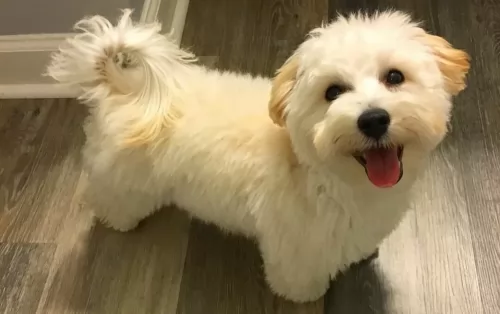 The Maltipoo is a popular dog breed – a cross between the Maltese and Poodle. The dog originates in the United States.
The Maltipoo is a popular dog breed – a cross between the Maltese and Poodle. The dog originates in the United States.
The Maltipoo is a cross breed but it is often referred to as a designer dog because of it being purposely bred. The cute little dog has been created to be a companion dog, suiting allergy sufferers because of him being a low shedder and considered hypoallergenic.
The Maltipoo isn’t officially recognized as a true breed. Some Maltipoo Clubs and Registries have been formed.
 The Caucasian Shepherd is a large, impressive looking dog standing at between 64 – 75cm in height and weighing between 45 – 70 kg. He has an almost bear-like appearance. His coat can be shortish or even fairly long, and in different colors such as white, tan, brindle, grey and cream with a black mask.
The Caucasian Shepherd is a large, impressive looking dog standing at between 64 – 75cm in height and weighing between 45 – 70 kg. He has an almost bear-like appearance. His coat can be shortish or even fairly long, and in different colors such as white, tan, brindle, grey and cream with a black mask.
The puppies are born black and then lighten as they grow up. He has a large head with the muzzle being smaller than the skull, narrowing slightly. The nose is black and the ears are set high and are floppy with dark eyes. The tail is set high and is long.
The Caucasian Shepherd is an intelligent breed but he must be properly trained and socialized as he can be stubborn and want to go his own way.
He is a balanced dog and he won’t deliberately hurt whom he regards as family, but he shows distrust towards strangers. While socialization and training relax and calm a dog, the Caucasian Shepherd isn’t regarded as the best dog to have with children around. This is because he comes from a lineage of guard dogs, bred to fight and guard.
He is a dog breed that will require a firm, strong owner and if you don’t have a lot of time on your hands, the Caucasian can be difficult to manage and perhaps isn’t the best choice for a first-time dog owner.
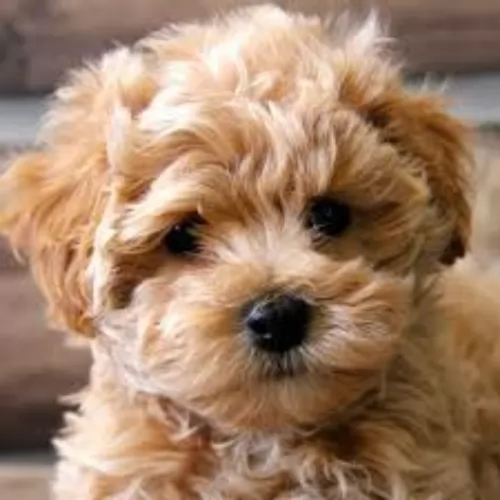 The small Maltipoo stands at between 20 and 35cm and weighs about 2 to 6kg. There is no breed standard for this dog. The coat is fluffy and is more inclined to be wavy than curly. It can become quite long and most people prefer to have him professionally clipped.
The small Maltipoo stands at between 20 and 35cm and weighs about 2 to 6kg. There is no breed standard for this dog. The coat is fluffy and is more inclined to be wavy than curly. It can become quite long and most people prefer to have him professionally clipped.
Coat colors vary from white to cream, apricot and brown or it can be a combination of these colors. He has a tail which some people prefer to dock, but if not, the tail is long and curls, sometimes over the back.
Owning a Maltipoo, you’ll quickly discover that this little dog is active, feisty, bright and, fun-loving, and your life is pretty much not going to have a dull moment with him in it.
If you’re a first time dog owner you’ll love the Maltipoo as he is pretty much easy going. He makes an excellent family pet as he is even tempered. Make sure your kids have been taught how to treat him – with respect, gentleness and kindness. Never allow toddlers to climb over any dog – big or small.
The Maltipoo is intelligent too and this means training and socialization will be easy for him. Many people use them as therapy dogs and they definitely seem to have an affinity with older people, bringing joy into their lives with their bright nature.
They are dogs that can adapt to life in the city or the countryside, just so long as they are with their beloved human family. They’re essentially indoor dogs but will gladly venture outdoors if it means ball games on the lawn with the children or a walk outside the confines of his home. This gives him the opportunity to smell new aromas, a physically and mentally stimulating game for him.
 Loyal, strong, and brave, the Caucasian Shepherd Dog does an excellent job protecting his human family. He is a territorial dog and in the past he has always been ready to take on wolves and bear to protect his sheep. He isn't the best choice for first time dog-owners and where there are small children in the home.
Loyal, strong, and brave, the Caucasian Shepherd Dog does an excellent job protecting his human family. He is a territorial dog and in the past he has always been ready to take on wolves and bear to protect his sheep. He isn't the best choice for first time dog-owners and where there are small children in the home.
He will do well to be trained and socialized as he becomes an obedient, patient, gentle, loving pet that becomes an excellent companion and protector.
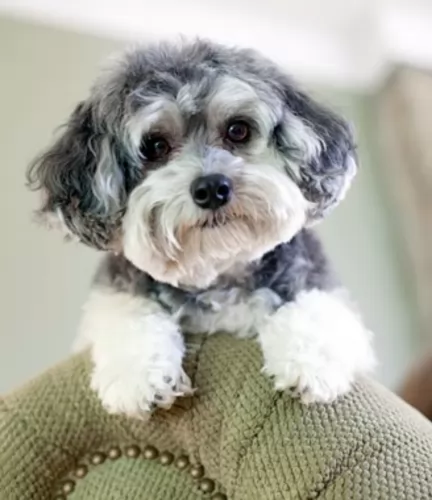 Your Maltipoo is guaranteed to bring much joy into your home. He is a social dog, loving to spend time with his human family, whether indoors our outdoors. He is an active dog so will look forward to his walk every day.
Your Maltipoo is guaranteed to bring much joy into your home. He is a social dog, loving to spend time with his human family, whether indoors our outdoors. He is an active dog so will look forward to his walk every day.
Treat your little pet with love and good care, after all he has got so much companionship to offer and deserves the best there is to that the 12 to 15 years he has are filled with health and happiness.
 Like all breeds there may be some health issues, even though the Caucasian Shepherd is generally a healthy dog. There are some common illnesses that every dog can get and which every responsible dog owner should be aware of -
Like all breeds there may be some health issues, even though the Caucasian Shepherd is generally a healthy dog. There are some common illnesses that every dog can get and which every responsible dog owner should be aware of -
One or two episodes of diarrhea isn’t an emergency, but ongoing diarrhea can lead to dehydration. If your dog is vomiting, he is lethargic and constantly emptying his bowels, see your vet if the diarrhea persists.
Parasites such as fleas and ticks and even internal parasites such as intestinal worms can drain the life from your pet. It is wise to find out about different parasites so that you can protect your dog. Find out what your vet’s treatment options are for parasites.
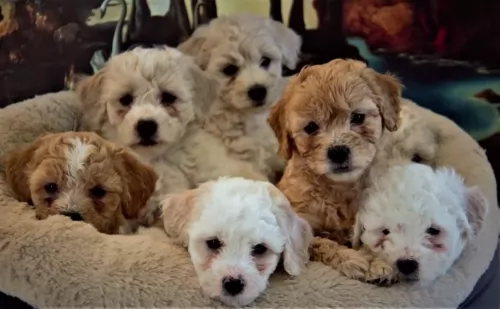 The Maltipoo is such a bright little dog, brimming with energy, but even so, he can get sick, just like with any other dog.
The Maltipoo is such a bright little dog, brimming with energy, but even so, he can get sick, just like with any other dog.
Small dogs are prone to dental problems and gum disease and tartar build up can cause many problems and tooth loss. Any dental infections can lead to infections which can put the entire body in jeopardy.
This is a degenerative eye disorder that can cause blindness and although there is no cure there are things that the vet can do for your pet.
 The Caucasian Shepherd Dog has a thick double coat that will certainly require brushing twice a week. The coat comes in different lengths – short, medium and long. The hair is mostly long and the long tail is also feathery. The best way to groom your large, furry pet is to invest in some good grooming tools such as a good brush to keep your pet’s hair in tip-top condition.
The Caucasian Shepherd Dog has a thick double coat that will certainly require brushing twice a week. The coat comes in different lengths – short, medium and long. The hair is mostly long and the long tail is also feathery. The best way to groom your large, furry pet is to invest in some good grooming tools such as a good brush to keep your pet’s hair in tip-top condition.
His nails will need to be trimmed regularly, his ears will also need to be checked to avoid wax build-up and the accumulation of grime. This can lead to an ear infection. His teeth should be brushed 2 or 3 times a week with special dog toothbrush and toothpaste.
The Caucasian Shepherd isn’t going to do well in a small home with tiny garden in the city. He is a big dog that will require a large yard even though he is a fairly low-energy dog. He will be suited to a family that is active, that will take him on daily walks, hikes and include some ball games.
You will need to change your Caucasian Shepherd Dog’s food as he goes through the different phases of his life, from puppy to adulthood. Speak to your veterinarian about a commercially produced dog food is you’re unable to give him home-made food. These foods are available in breed-specific and age-specific formulas.
Reputable breeders will also help you ensure that you know how to start feeding your puppy. Caucasian Shepherds are a large breed and apart from their kibble, you’ll want to include rice, vegetables and cooked chicken from time to time in his kibble and also include raw meat occasionally.
If you're unsure, ask your veterinarian or breeder about the best diet to ensure his longevity. Clean, fresh water should be available at all times.
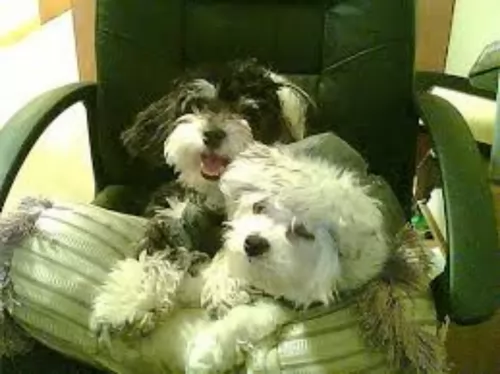 The Maltipoo is such a sweet little dog – you want to be sure that you look after him as well as can be.
The Maltipoo is such a sweet little dog – you want to be sure that you look after him as well as can be.
Always take your pet for regular veterinary check-ups if you suspect he is ill. If you get a Maltipoo puppy you will need to take him to the vet because there are a number of vaccines he will need to prevent him from picking up some life threatening canine diseases. Some of these are parvo and rabies among others.
Also, as your Maltipoo reaches adulthood you will need to decide whether you will have the dog spayed or neutered to prevent puppies.
Groom your Maltipoo to keep the coat in tip top condition. Brush him at least twice a week to keep him free of loose hairs. It’s a nice bonding session for your pet too and it gives you the chance to check for fleas and ticks. Most Maltipoo owners take their pets to professional groomers to have the coat trimmed as then he looks and feels more comfortable in warmer weather.
Be careful about bathing him too often as even the mildest shampoos can irritate his skin and it strips the coat of natural oils. Other grooming needs will require you keeping his nails short and cleaning his teeth at least 2 or 3 times a week. Because he has floppy ears, check inside them as they can collect excess wax and debris.
If you are unsure about these kinds of grooming needs, check with your vet or groomer because doing it wrong could cause injury to your pet.
Give your pet a soft, warm, dry bed to sleep in. You can make a soft ‘nest’ on the floor or you can buy a sleeping platform or traditional dog basket.
With a Maltipoo, choose a high-quality small breed dog food if you are going to feed him commercially manufactured food. This is to ensure he remains healthy. Try and keep your diet simple for your Maltipoo to avoid stomach problems.
For variety, add in some chopped boiled chicken, brown rice and vegetables to his dry kibble. The amount of food you give him will depend on his size and activity levels but you want to avoid feeding him too much so that it leads to obesity. Obesity can bring on a host of dog illnesses.
As opposed to one larger bowl of food, rather feed him two smaller meals which is far healthier for him. Remember to always have a bowl of fresh, cool water standing close by.